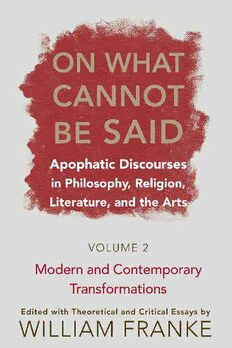
On What Cannot Be Said: Apophatic Discourses in Philosophy, Religion, Literature, and the Arts. 2. Modern and Contemporary Transformations PDF
Preview On What Cannot Be Said: Apophatic Discourses in Philosophy, Religion, Literature, and the Arts. 2. Modern and Contemporary Transformations
00 Franke vol 2 fm-intro 2/16/07 2:52 PM Page i This content downloaded from 00 Franke vol 2 fm-intro 2/16/07 2:52 PM Page ii This content downloaded from 00 Franke vol 2 fm-intro 2/16/07 2:52 PM Page iii O N W H AT C A N N OT B E S A I D Apophatic Discourses in Philosophy, Religion, Literature, and the Arts . Edited with Theoretical and Critical Essays by William Franke University ofNotre Dame Press Notre Dame,Indiana This content downloaded from 00 Franke vol 2 fm-intro 2/16/07 2:52 PM Page iv University of Notre Dame Press Notre Dame, Indiana www.undpress.nd.edu All Rights Reserved Copyright © by University of Notre Dame Published in the United States of America Library ofCongress Cataloging-in-Publication Data On what cannot be said :apophatic discourses in philosophy,religion,literature, and the arts :vol.: Modern and contemporary transformations / edited with theoretical and critical essays by William Franke. p. cm. Includes bibliographical references. ISBN-13: 978-0-268-02885-5 (cloth : alk. paper) ISBN-13: 978-0-268-02883-1 (pbk. : alk. paper) ISBN-13: 978-0-268-07056-4 (web pdf) .Mysticism. .Negative theology. .Speeches,addresses,etc. I.Franke, William. . —dc ∞The paper in this book meets the guidelines for permanence and durability ofthe Committee on Production Guidelines for Book Longevity ofthe Council on Library Resources. This content downloaded from 00 Franke vol 2 fm-intro 2/16/07 2:52 PM Page v Ifthat be simply perfectest Which can by no way be expresst But negatives,my love is so. To All,which all love,I say no. —John Donne,“Negative Love” Comme certaines musiques Le poème fait chanter le silence, Amène jusqu’à toucher Un autre silence, Encore plus silence. —Eugène Guillevic,“Art poétique” This content downloaded from 00 Franke vol 2 fm-intro 2/16/07 2:52 PM Page vi This content downloaded from 00 Franke vol 2 fm-intro 2/16/07 2:52 PM Page vii CONTENTS Preface:Apophasis as a Mode of Discourse Introduction:Modern and Contemporary Cycles of Apophasis F F . Hölderlin,Poems: “What Is God?,”“The Root of All Evil,” “In My Boyhood Days,”“Exhortation,”“Brevity” . Schelling,“The Stupor ofReason,”from The Philosophy ofRevelation, Berlin Introduction,Lecture VIII . Kierkegaard,Fear and Trembling,from Problema III . Dickinson,Poems ,,,,,,,, ,, . Hofmannsthal,The Lord Chandos Letter . Rilke,Duino Elegiesand ;Sonnets toOrpheusI.,, . Kafka,“On Parables”and “The Silence ofthe Sirens” . Benjamin,“The Task ofthe Translator” N A P . Rosenzweig,from The Star ofRedemption:God and His Being or Metaphysics;Esthetic First Principles;The Proper Name; Liturgyand Gesture;The Star or the Eternal Truth . Wittgenstein,“A Lecture on Ethics”and Tractatus.– . Heidegger,“Words,”from On the Way to Language . Weil,“He Whom We Must Love Is Absent” This content downloaded from 00 Franke vol 2 fm-intro 2/16/07 2:52 PM Page viii viii Contents D, C, R N . Malevich,“God Is Not Cast Down” . Schoenberg,Moses and Aaron,Act II,scenes –, and Act III (fragment) . Adorno,“Music and Language:A Fragment,”from Quasi una fantasia,and Negative Dialectics,III.iii. . Cage,“Lecture on Nothing,”from Silence . Jankélévitch,“Music and Silence,”from Music and the Ineffable . Beckett,from The Unnamable and “Texts for Nothing,”# . Steiner,“Silence and the Poet,”from Language and Silence . Philip,from Looking for Livingstone: An Odyssey ofSilence T U O . Bataille,fromInner Experience . Jabès,from El,or the Last Bookand The Book ofResemblances . Celan,selected poems: “Below,”“An Eye,Open,”“With All My Thoughts,” “Dumb Autumn Smells,”“Psalm,”“It Is No Longer,”“Mandorla,” “Etched Away,”“Once,”“The Trumpet Part,”“The Poles” . Levinas,from Otherwise than Being or Beyond Essence . Blanchot,“How to Discover the Obscure?”from The InfiniteConversation . Derrida,from “Saufle nom (Post-Scriptum),”in On the Name . Marion,from God Without Being Permissions and Acknowledgments This content downloaded from 00 Franke vol 2 fm-intro 2/16/07 2:52 PM Page 1 PREFACE Apophasis as a Mode of Discourse The critical revolution of recent decades has changed how we approach the reading and understanding oftexts.We have become increasingly sensitized to the factthat weneed not—and cannot—always take discourse at its word.For the word often,if not always,covers over more than it makes manifest,con- ceals as the very condition by which it reveals.We have therefore been relearn- ing to read for what words do not and perhaps cannot say.This entails attend- ing especiallyto the ruptures and interruptions,to the silences and ellipses, that displace discourse and break the circuits of sense.These gaps open dis- course to the non-sense or surplus ofsense that it embodies and bears witness to,even without being able to say it.The motivations ofdiscourse lie to a great extent in what cannot be said,and to read for this unsayable that is betrayed especially by impasses to saying is to recognize the moment of apophasis,of silenceand unsaying,as constitutive ofsaying and its meanings. “Apophasis”is the word used by Plato and Aristotle simply for a nega- tive proposition or denial.But etymologically it suggests even stronger nega- tivemeaningssuchas “away from speech”(apo:awayfrom;phasis:speechor assertion) or unsaying. Among the Neoplatonists,“apophasis”takes on the connotation ofa negation ofdiscourse simpliciter,for they concentrate on the inability ofdiscourse per se to affirm anything whatsoever about ultimate re- ality,for them “the One.”Ever since these ancient and endless speculations,the intrinsic limits ofdiscourse,with its failure to attain its object and to articulate the ultimately real,as well as the silence that follows as a consequence,have been a perennial preoccupation,especially at certain junctures,ofthe Western intellectual tradition.The great variety ofdiscourses—and inflections ofdis- courses—that have resulted can be considered together as different expres- sions ofan apophatic mode. As a discursive mode,apophasis arises in the face ofwhat cannot be said. Itbespeaks an experience ofbeing left speechless.There are no words for what is experienced in this form ofexperience,no possibility ofa positive descrip- tion ofit.One falls back on saying what it is not,since whatever canbe said is notit.Bytheir very failure,however,conspicuously faltering and foundering This content downloaded from
